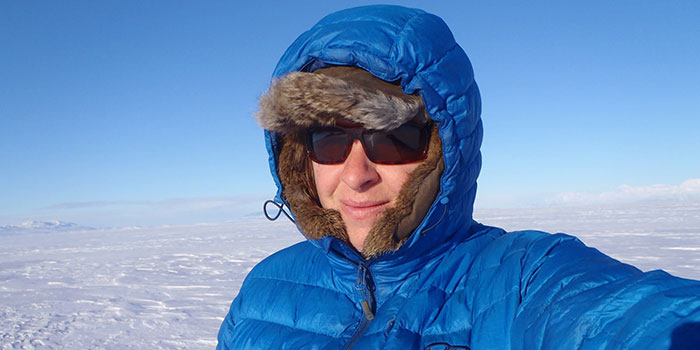
Meet Amanda Kelley
Dr. Amanda Kelley is an Assistant Professor at the College of Fisheries and Ocean Sciences, University of Alaska Fairbanks. Read her interview below to learn more about her job.
Video
This was a fun day on the job. We were sampling for zooplankton at the ice edge in McMurdo Sound, Antarctica. Download (mp4, 921 KB).
View more pictures and video from Amanda's careerAbout the Job
What is your title?
Assistant Professor.
Where do you work?
College of Fisheries and Ocean Sciences, University of Alaska Fairbanks.
Do you travel often? To where?
I do travel quite a bit for my job. I have been going to Antarctica for five out of the last six years, from 2010-2015. I have also worked in California, British Columbia, Canada, and recently in Alaska. There is always a field component related to my research, which is one of the things I love about my job. I get to go to some of the most interesting places in the world.
What are the educational requirements for your job?
I have a PhD in biology.
What is the salary range for someone with your type of job?
More than $75,000 per year.
How many hours do you work per week?
60.
Job Duties
Tell us about your research and the types of things you do.
I am an ecological physiologist. My work involves both experimental biology and characterizing the environment in which the target organism lives. My research interests include understanding the biological impacts of ocean change, with a focus on characterizing environmental variables associated with ocean change (e.g., ocean acidification, temperature, hypoxia); using remote oceanographic sensors; and pairing collected data with laboratory studies to measure the physiological responses of individuals of certain species to ocean change. I am particularly interested in understanding ocean change impacts in polar marine ecosystems, areas that are predicted to be the first to experience such changes.
What is the most fascinating thing you have ever seen or done?
ThScuba diving in Antarctica under the sea ice was a once-in-a-lifetime experience. The sea ice filters sunlight in such a way that the whole underwater scene is a light blue color; it’s very beautiful. The water is some of the clearest in the world, visibility can be 150 meters and greater. Because the sun is tucked away during wintertime, there is almost no phytoplankton in the water column when I arrive in the fall (austral spring) for my field work. There are actually underwater vistas to be seen, which is a strange concept for most scuba divers.
What are the personal rewards of your work?
I love asking an interesting science question and then working hard to try and answer that question. What always inevitably happens is that answering that one question leads to a handful of new questions, again renewing my quest for answers.
How does your work benefit the public?
My research focuses on the biological impacts of ocean change, including shifting pH, temperature, salinity. The absorption of carbon dioxide by the world’s ocean is having, and will continue to have, serious consequences for marine organisms, communities, and ecosystems worldwide. Understanding exactly what those consequences are, and how they will impact society at large, is extremely important.
What else could someone with your background do?
Teaching is certainly something I could do, given my area of expertise.
About Amanda
What sparked your initial interest in ocean sciences?
As a child I really enjoyed tide pooling at the beach in the San Juan Islands, Washington State. I would sit in the tide pools and try to identify as many animals as I could. I was always so blown away by the number of organisms that lived in such a small area. They were so colorful, and strangely shaped, I was really enamored by them. I love to surf, also. I just love being around the ocean.
Who influenced you or encouraged you the most?
My mom, who always told me I could be whatever I wanted to be.
Looking back, was there anything you would have done differently in your education or career journey?
No. My journey was atypical in that I took a long break between my first experience as an undergraduate student and then moving on to graduate school. I gained a lot of life experience that has really helped me be a better scientist. In particular, my problem solving skills really benefitted from my work outside academia.
What obstacles did you encounter along the way?
I don’t really think I experienced any “obstacles.” Rather, I enjoyed the challenges I faced as I moved from one phase of my career to another.
What are your hobbies?
Wildlife photography, scuba diving, hiking, going on adventures with my family, fishing, and bicycling.
Career Timeline
Beginning of Interest in Marine Sciences:
My interest in marine sciences started as a kid during camping trips when I observed the diversity outdoors.
First Marine Science Class:
I took some marine biology classes during college, and my first hands-on experience was during an internship which got me started on science diving and research.
Degrees:
Bachelor's degree and PhD in Biology.
First Career-related Job:
My first real job in the field was a summer internship.
Employment Journey/Career Transitions:
I have had several careers. I started college right out of high school, but decided to quit and join a rock band for about four years. Then I became a carpenter for about eight years and moved from apprentice to lead carpenter. In my mid-30s, I decided I was not finished learning yet and wanted to push myself further, so I finished my Bachelor’s degree in Biology and went straight on to get my PhD.
Other Accomplishments
I convert climate change science into curriculum for the classroom.